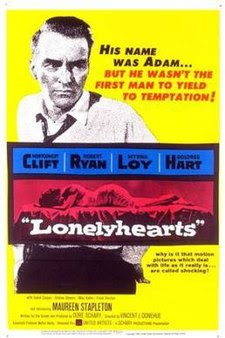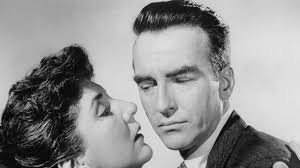Director: Vincent Donehue
Year: 1958
Rating: 5.0
I just finished reading the Nathaniel West novella Miss Lonelyhearts and
was really curious as to how 1950's Hollywood would adapt this into film.
This wasn't the first-time Hollywood tried. In 1933 20th Century did a version
called Advice to the Lovelorn that I have not been able to see, but they
tried again in 1958 after a Broadway production in 1957 lasted all of 12
performances. Dore Schary who produced this film had been the head of MGM
from 1951 - 1956 when he was fired, but continued to produce a few films
afterwards. Why this? I can't imagine.
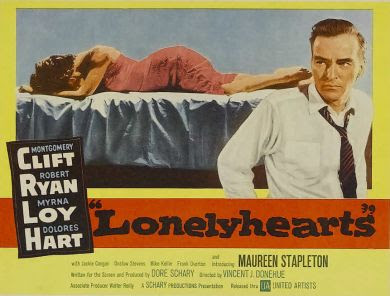
Nathaniel West wrote Miss Lonelyhearts in 1933 when he was working nights
at a hotel in NYC. He soon moved to Hollywood to write scripts which he hated,
describing it "All the writers sit in cells in a row and the minute a typewriter
stops someone pokes his head in the door to see if you are thinking. Otherwise,
it's like the hotel business." His experience in Hollywood led to his writing
Day of the Locust in 1939 (that of course was adapted into a film in 1975).
Both that book and Miss Lonelyhearts are considered American classics, but
that assessment came after West's death in a car accident in 1940. During
his lifetime, his books brought in the majestic amount of $1,280.
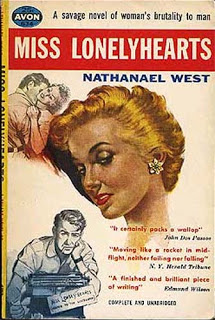
Both books are acidic and rancid portraits of humanity. Miss Lonelyhearts
is a sour and depressing journey into the blackness and rotting of the human
heart. There is no good. There is no salvation. Everything and everyone around
us corrupts us. Much of the book feels as if someone is tearing bandages
off of the hairs on our body – one by one. It is intense and unforgiving.
It is also beautifully written with dialogue as sharp and brilliant as any
you will come across. It is 1933. The Depression is in full swing. There
is a lot of hopelessness to go around. West burrows into it with a sharp
scalpel and a blow torch.
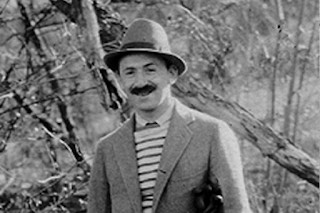
It is the story of a man losing his grip on life, losing hope, looking for
redemption in bars and God. He is Miss Lonelyhearts – the advice writer in
a newspaper to all the people out there reaching out to him with their stories
of misery looking for answers to which he has none. It begins to tear him
into small pieces. He begins to get a Christ complex looking to save the
downtrodden. His boss Shrike is the King of Cynical Philosophy spewing taunts
and wisdom like a broken fire hydrant in the middle of a broken marriage
that won’t go to its natural death. Everyone is broken. And then suddenly
the book is over with a hopeless sudden bang.
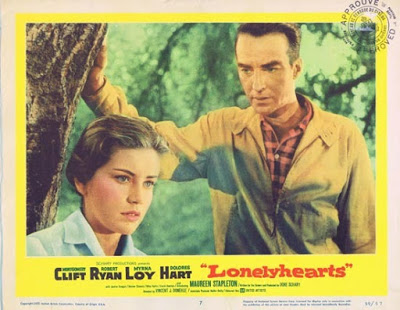
So how do you make a film out of this? Not easily I imagine and certainly
this film misses out. It follows the plot of the book at a distance and occasionally
up close at times, but it is in Hollywood fashion drained of the visceral
anger, bitterness, hopelessness and fatalism that permeates the book. It
even throws in a happy ending of course. And not a word about religion or
Christ. It plays it safe but by doing so plays it soap opera boring.
Montgomery Clift who plays Miss Lonelyhearts (in the film he is given a name
but only referred to as Miss Lonelyhearts in the book) comes across as basically
a good man who goes through a learning experience and comes out a better
man at the end of it, Shrike played nicely by Robert Ryan is just testing
his employee with reality, Miss Lonelyhearts has a sweet and loving girlfriend
who he loves in return, Shrike’s bitter wife is played by Myra Loy and watching
her as an unhappy hard drinking wife killed me – she will always be Nora
to me.
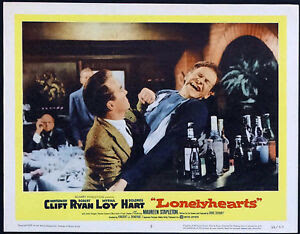
This was one of Clift’s first films after his near fatal car accident – perhaps
saved by Elizabeth Taylor where had been partying – and his portrayal is
awkward and too sensitive. He had begun taking a lot of pain killers that
eventually led to his death in 1966 – and maybe this is why his performance
seems so lacking in energy with those weird vacant eyes looking out of focus
at times. In the book his character is basically an unlikable prick but that
too was not transferred to the film. I could see this film being made again
in today’s film culture as a small indie, but trying to do it in the 1950’s
made no sense.
